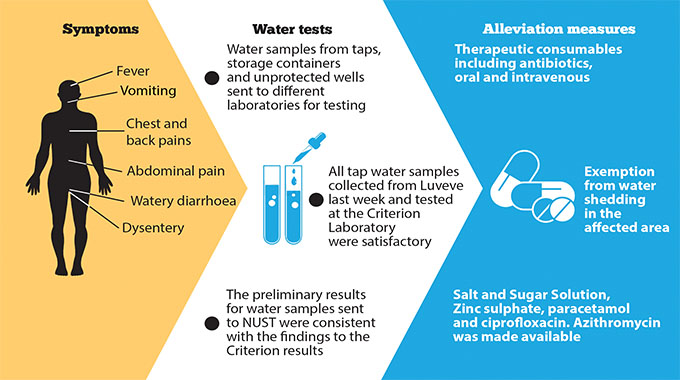Vulnerable groups appeal for food hampers

Mashudu Netsianda and Thandeka Moyo-Ndlovu, Chronicle Reporters
VULNERABLE groups are appealing for Government to consider introducing monthly food hampers in addition to the Covid-19 allowances, citing the rise in cost of living which has eroded their social grants.
The pandemic has affected economies worldwide and has left many struggling to put food on the table.
Locally, over 197 000 vulnerable households affected by the global pandemic receive monthly allowances from the Government to buy food. The beneficiaries are, however, saying the money is not enough due to a sharp increase in prices of basic commodities.
A snap survey conducted by Chronicle in selected shops in Bulawayo revealed that a basic food basket comprising a 10kg bag of mealie meal, 2kg packet of sugar, 2kg of salt, 2 litre bottle of cooking oil, flour and a packet of beans costs about $1 800.
Bulawayo has more than 100 000 elderly people and those living with disabilities and they are unemployed and survive on handouts from generous donors and well-wishers and selling in street corners. However, due to the Covid-19 lockdown, people living with disabilities in Bulawayo, are among those worst affected since a majority of them largely survived on alms from members of the public and selling.
Due to the stay home order, disabled people in business could no longer access the city centre to sell their wares.
Some were affected by the closure of 5th Avenue vending site where they used to operate from.
Ms Sikhulekile Ncube from Mzilikazi is looking after five children and her elderly mother yet she has no means of income.
“We used to rely on my sister who lives in South Africa and I used to sell vegetables to supplement the basics that she sent us. When there was a Covid-19 outbreak we registered for Government assistance and we got $180 in May,” said Ms Ncube.
She said although the money was reviewed to $300, it is not enough.
Ms Ncube said she now prefers getting a bag of mealie-meal like other vulnerable people in the rural areas since the cash payout was not enough.
“We have heard of other schemes where our fellow residents are getting at least US$9 per person and that is better compared to what we are getting. We are looking to Government to intervene and save vulnerable members of our community,” she said.
Mrs Yvonne Mathe, a Cowdray Park resident, said she has conducted a survey through residential WhatsApp group created to help vulnerable families.
“I got overwhelming inboxes with people saying they were going to bed without adequate meals. I, therefore, suggest that there could be an alternative way of addressing the plight of vulnerable groups such as food hampers just like in some countries,” she said.
Federation of Organisations of Disabled People in Zimbabwe (FODZ) national chairperson, Senator Watson Khupe, who is also representing people living with disabilities in the Senate, urged Government to speed up the process of disbursement of funds as well as considering introducing food hampers in addition to the monthly $300 allowances.
“We appreciate what Government has done but we are saying the delays in the disbursement of the money coupled with inflation is now creating a bad perception about Government. This money was promised three months ago and some people started receiving it four days ago and sadly some did not receive $300, but $180,” he said.
Sen Khupe said when they started getting the Covid-19 allowances, the money was enough to buy grocery to last for at least two weeks. “However, the $300 that we are now getting can only buy one meal per month. If you get it today, you can only spend it either on lunch or dinner and what then happens in the next 30 or 31 days?”
Sen Khupe said due to the lockdown, some of their members who relied on selling wares in the CBD are in dire need of capital. “They ended up eating into their capital which was supposed to be used to buy more stock because of the lockdown. We implore Government to consider recapitalising these vendors so that they can resume their businesses,” he said.
Sen Khupe said it was important to distribute food hampers in rural areas where there are network challenges making it difficult for beneficiaries to access the social grants.
According to the World Food Programme, Covid-19 has increased the number of food insecure people by as much as one million as the lockdown further constrained the economy and severely affected Zimbabweans whose livelihoods depend more on the informal sector.
Public Service, Labour and Social Welfare Minister Professor Paul Mavima on Wednesday told Parliament that Government continued registering affected families.
He was responding to Highfield East legislator Mr Eric Murai who has asked about measures taken to help vulnerable people living with disabilities.
“Of those that were affected by Covid-19, we have now registered 197 000 households and as of this week, those have been paid their May and June allowances — the May allowances were $180 per household and the June allowance has gone up to $300 per household,” said Prof Mavima. “So, 197 000 were catered for and for those living with disabilities, we have a separate programme that runs always as they are supposed to register with the Department of Social Welfare.”
Prof Mavima said the intervention programme which was introduced before Covid-19 was still running for vulnerable households. “This is a programme that runs always; it is not Covid but is just a programme that assists vulnerable people. If they are in the rural areas, they get cereals; 50kgs typically of maize but sometimes also traditional grains to take them for a month,” he said.
Prof Mavima said urbanites receive cash for cereal similar to the one that being given to households affected by Covid-19.
“Such households will receive $300 per month and we are working on making sure that we get additional allocation from Treasury in order to improve these allocations,” he said. — @mashnets@@thamamoe












Comments